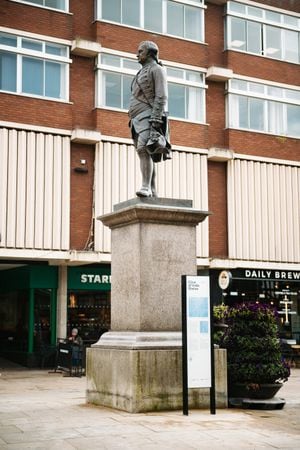'Interpretation board' added to controversial Clive of India statue at centre of colonialism row
An information panel has been installed next to Shrewsbury's controversial Clive of India statue – nearly three years after the plan was originally agreed.

Shropshire Council said it would put the panel in place after its cabinet members decided against removing the statue, which stands in Shrewsbury's Square, in July 2020.
It said the panel would add "context to the colonial history of Robert Clive".

Shropshire Museum Service drafted the wording planned for the board – which was agreed by the cabinet members.
The council said that "relevant stakeholders" were consulted before the project was "unavoidably delayed" by the restrictions of Covid-19.
Speaking after the panel was installed today Rob Gittins, Shropshire Council cabinet member for culture and digital, said: “Current legislation surrounding contested history is to ‘retain and explain’ and Shropshire Council is working to that expectation.

“An interpretation panel has now been installed beside the statue in The Square. The text has been composed by the Shropshire Museums curatorial and interpretative team in consultation with interested parties and has been agreed by Shropshire Council cabinet members.
"Prior to the installation beside the statue the information was displayed close by in Shrewsbury Museum and Art Gallery."

Calls to remove the landmark came after the toppling of a statue of the slave trader Edward Colston in Bristol.
Campaigners had argued that Robert Clive should not be celebrated with such a prominent statue due to his role in establishing British colonial control of India through his involvement in the East India Company.
His rule as the first British Governor of Bengal saw widespread looting of the region’s wealth and treasures, and changes the company made to taxes and agricultural policies are said to have led to the Bengal Famine of 1770, which saw around a third of the region’s population starve to death.
But those in favour of keeping the statue argued its removal would be an attempt to erase him from Shrewsbury’s history, with Clive also having served as the town’s mayor and MP.





